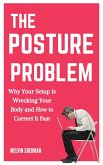This book challenges the widely accepted belief that better time management leads to more free time. The truth is, no amount of efficiency or discipline will ever create the perfect schedule. The world demands too much, and modern life is structured to ensure that time will always feel scarce. Why You'll Never Have Enough Time exposes the hidden forces that make people feel behind, overcommitted, and stretched thin, no matter how hard they try to stay ahead.
The obsession with productivity has led to a dangerous mindset-one that equates self-worth with output. The more tasks completed, the more valuable a person feels. But this pursuit creates a cycle where completing one task only makes room for more, and the cycle never stops. The modern individual is conditioned to believe that time can be controlled, optimized, and stretched. Yet the more that effort is made to manage time, the more overwhelming it becomes.
The pressure to "make the most of every moment" leads to a culture of unrealistic expectations. The perfect balance between work, relationships, health, and personal fulfillment remains out of reach because it is an impossible standard. There will always be more responsibilities, new goals, and unforeseen demands. Trying to fit everything into a limited number of hours is not just frustrating-it is fundamentally flawed thinking.
The key to changing this relationship with time is not to squeeze more into the day, but to change the way time is viewed. This book explores why traditional time management strategies fail and why the pursuit of productivity often leads to burnout instead of relief. The problem isn't a lack of discipline or planning-it's the belief that time is something to be conquered.
Instead of focusing on doing more, the solution lies in doing less but with greater intention. The book highlights how prioritization, boundaries, and selective effort create a more sustainable approach to daily life. The constant urgency to keep up is a manufactured pressure-one that benefits businesses, employers, and external forces more than it benefits the individual. Learning to step outside this system is the first step toward regaining control.
This book also examines the psychological weight of unfinished tasks, the illusion of control that planners and schedules provide, and the way modern technology has created an always-on culture. The more connected society becomes, the harder it is to set boundaries. The pressure to respond immediately, stay updated, and remain available creates a false sense of busyness-one that drains energy without providing real progress.
Understanding why time always feels scarce allows for a different approach-one that acknowledges limitations rather than fighting against them. It requires letting go of the belief that everything can be completed, that there is a "right" way to structure a day, and that busyness equals importance. Only by shifting this mindset can true freedom from the time trap be achieved.
This book is not about making better schedules or adopting another time management system. It is about recognizing why the feeling of never having enough time exists in the first place. By identifying the real obstacles, it becomes possible to focus on what matters most and stop chasing an unreachable ideal.
Dieser Download kann aus rechtlichen Gründen nur mit Rechnungsadresse in A, B, CY, CZ, D, DK, EW, E, FIN, F, GR, H, IRL, I, LT, L, LR, M, NL, PL, P, R, S, SLO, SK ausgeliefert werden.









